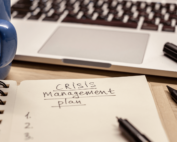Up until recently, the odds of a ‘crisis’ occurring probably seemed quite unlikely for most organisations. The impact of the global pandemic has been a stark reminder that they can and do happen, and when a genuine crisis befalls us, it’s all hands on deck to manage the fallout.
Organisations around the globe have done an incredible job pulling out all the stops to protect themselves and their customers and employees from something completely outside their control. However, while many organisations deserve praise for their efforts and swift response, the fact remains that because many companies never experienced a true crisis prior to COVID-19, they were ill-prepared to react to the situation in the most effective way.
Although the majority of companies have crisis management plans in place, the reality is that most of these go untested, and few employees are even aware of the procedures and actions to be taken in the event of an emergency. And while most managers and leaders are exceptional at handling the day to day operations of their business units, rarely have they been adequately prepared to tackle a crisis, especially one of the magnitudes we’ve recently experience.
Recent events have truly exposed the reality that more needs to be done to prepare our businesses for crises, and while much of the responsibility is handed to operational teams to develop disaster and recovery plans there’s often much more to it. To successfully survive a crisis situation you need a resilient workforce, strong teams, clear leadership, and exceptional communication plans. When it comes to crisis management and recovery, L&D functions have a valuable role to play in preparing individuals to survive a crisis situation.
Crisis leadership skills, Teaming skills and communication skills are all areas L&D can support, and while the ideal scenario would be to ensure your organisation is adequately equipped in all these areas prior to an emergency, this is often not the case. Because a crisis happens so rarely, the focus is naturally on the daily operational needs. However, as we’ve all discovered developing your workforce to help them react confidently and competently to a challenging and scary crisis is essential.
How Can L&D Help?
Running Crisis Management Sessions
L&D teams are experts at facilitating learning events, so it therefore makes sense to collaborate with them in designing and running crisis management simulations and events. The need for COVID related crisis simulations may have passed, there are always other risks to consider preparing for. With their expertise in making learning impactful and engaging, L&D professionals can help ensure that your session has the desired outcomes and results in a sustainable action plan.
Team Building
In any crisis scenario it’s likely that disparate teams will be required to work together to manage the situation. As such, these teams will need to have the opportunity to come together and develop as a single unit. But odds are the individuals involved will never have worked together before, so having a programme of team building will help establish the relationships, and find a way for the team to work together most effectively. Team building events may utilise tools such as psychometric profiles or the development of team charters to ensure each member has a good understanding of their colleagues and the conduct expected within the team. Supporting a team in developing greater cohesion will enable faster decision making, more efficient communication, and better outcomes when managing a crisis
Follow Up and Evaluation
Follow up post-learning is an area that all too often gets overlooked. On a regular training programme this is frustrating, but not typically disastrous. When dealing with a crisis, however, you need to know that you have properly evaluated and integrated the lessons learned from the experience. There is little point in running a practice scenario (or surviving a genuine crisis) if steps are not taken to address the gaps identified, and often teams and managers do not have the time or resources to do this on their own. It can therefore be highly beneficial to include the L&D function in this regard, whether they are in charge of the whole process or certain aspects, they can support teams in achieving objectives set out following an event. This may include running a similar scenario in the future, developing learning plans to address skills gaps or asking for feedback from the event.
Leadership
One of the most vital things to have in times of crisis is an effective, inspirational leader who can confidently take charge of the situation while still actively supporting their team to do their bit. However, crisis situations aren’t typically addressed during leadership events, and as such it may be worth considering collaborating with your L&D department to either include this within leadership programmes, or design stand alone sessions that deal with these issues. Effective leadership during a crisis can make the difference in how well and how quickly it is resolved, so inviting L&D to support this could be vital.
Stress Management and Resilience
Crisis situations are inherently stressful, which is one of the key reasons to plan, prepare and practice for them, to ensure the stress can be limited as much as possible via an effective response. However, there is also a great deal of benefit from continually supporting your staff in developing their day to day ability to manage stress and building their resilience and mental toughness. Staff members who feel capable in managing their stress will naturally respond more productively and effectively to a highly pressurised situation than those who struggle with this on a daily basis. By employing your L&D team to help staff manage stress and build employees’ resilience and mental toughness you will see a more productive and effective workforce no matter what the scenario.
No organisation wants to have to think about what would happen in a crisis, but as the saying goes it’s always better to ‘hope for the best and prepare for the worst’, and when it comes to crisis management L&D can be a valuable ally in ensuring your staff are ready to face whatever comes their way.
Read Next
The Importance of Resilience in the ‘Always On’ Era
Ignorance is bliss so they say, but in this day and age it’s hard to be ignorant of much. With round the clock news and social media updates, constant access to phones and the [...]
Who’s Taking Care of Managers?
A lot of responsibility is laid at the door of managers when it comes to looking out for their employees – they are asked to support individuals with job performance, professional development, career progression, [...]
How L&D Can Help You Survive a Crisis
Up until recently, the odds of a ‘crisis’ occurring probably seemed quite unlikely for most organisations. The impact of the global pandemic has been a stark reminder that they can and do happen, and [...]
What’s L&D’s Role in Employee Wellbeing?
A recent CIPD report stated that wellbeing is suffering as a result of the pandemic, but their wellbeing is barely (if at all) taken into account when business decisions are made. This is surprising, [...]
Out With Stress for National Stress Awareness Week
National stress awareness week is upon us again, and we wanted to explore stress from a positive angle this year. After all, most of us know about the negative effects of stress; poor concentration, [...]
Mental Health and Emotional Flexibility
In the past I have taken part in a wide variety of activities to raise awareness of the importance of Mental Health in the workplace, activities such as ‘Chimp Management’, resilience (learn about your [...]






